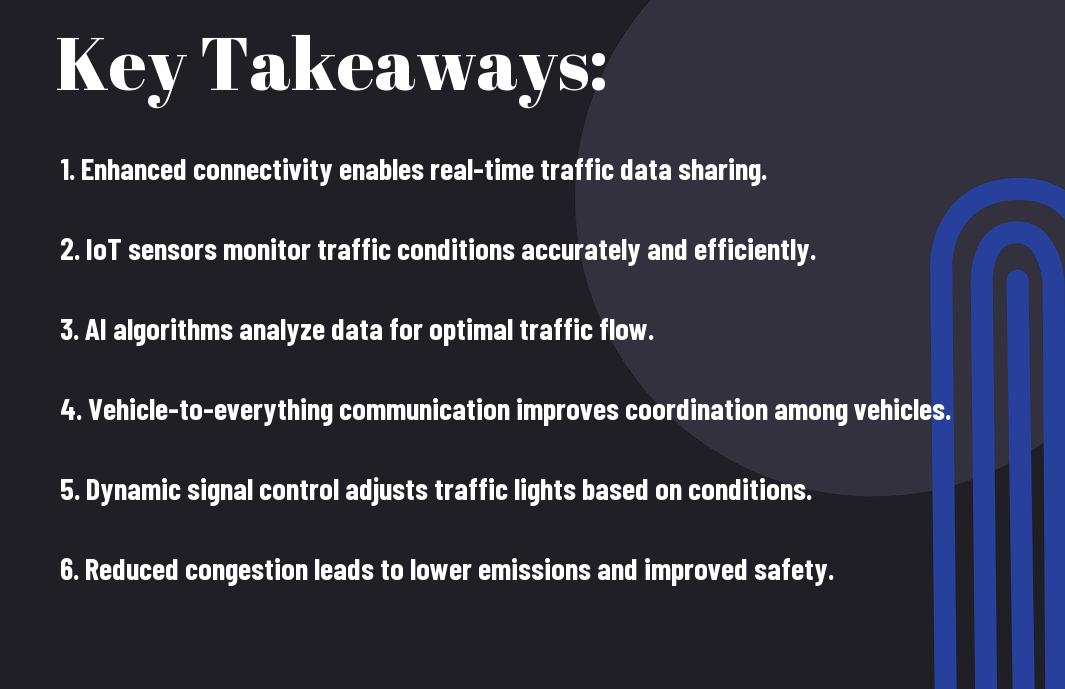As you navigate through busy city streets, you’ve likely experienced the frustration of traffic congestion. Your daily commute can be significantly impacted by inefficient traffic management. With the advent of 5G technology, your travel experience is about to change. You will soon benefit from smart traffic management systems that leverage 5G’s low latency and high-speed connectivity to optimize traffic flow, reducing congestion and decreasing travel times, making your commute faster and more efficient.

Principles of Smart Traffic Management
While navigating through the concept of smart traffic management, you will notice that it relies on the integration of technology and data to optimize traffic flow. Your understanding of these principles will help you appreciate how 5G is impacting this field.
Real-Time Data Collection
Around the clock, you are generating data as you move through the city, and this information is being collected to manage traffic more efficiently. Your daily commute is being tracked and analyzed to identify patterns and optimize traffic signal timing.
Intelligent Traffic Signals
Following the collection of data, you will notice that intelligent traffic signals are being optimized to minimize congestion. Your wait time at intersections is being shortened as traffic signals adapt to real-time conditions.
Considering the implementation of intelligent traffic signals, you can expect a significant reduction in congestion and travel time. Your daily commute will become more predictable and efficient as traffic signals adapt to your needs, and you will start to notice improvements in air quality and safety as well.

Role of 5G in Smart Traffic Management
You will notice significant improvements in traffic management with the integration of 5G technology, enabling real-time monitoring and optimizing traffic flow. This leads to reduced congestion and enhanced travel experiences.
Enhanced Connectivity
Among the key benefits of 5G in smart traffic management is the ability to connect a vast number of devices, allowing your city’s infrastructure to become more interconnected and intelligent.
Low Latency
Against the backdrop of increasing urbanization, 5G’s low latency ensures that your traffic management systems can respond quickly to changing conditions, making your commute safer and more efficient.
For instance, with 5G’s ultra-low latency, your smart traffic signals can adjust in real-time to optimize traffic flow, minimizing congestion and reducing travel times, making your daily commute more predictable and stress-free.
Applications of 5G in Traffic Management
Keep in mind that 5G networks are transforming the way you manage traffic. With 5G, you can expect faster data transfer rates, lower latency, and greater connectivity, making it an ideal technology for smart traffic management systems.
Traffic Prediction and Analysis
Toward optimizing traffic flow, 5G enables you to collect and analyze vast amounts of data from various sources, such as sensors and cameras, to predict traffic patterns and make informed decisions.
Autonomous Vehicles
Alongside the development of autonomous vehicles, you will see significant improvements in traffic safety and efficiency. With 5G, your autonomous vehicle can communicate seamlessly with other vehicles and infrastructure.
Traffic management is expected to become more efficient with the introduction of autonomous vehicles, as you will be able to navigate through roads with ease, and your vehicle will be able to respond to real-time traffic updates, ensuring a smoother and safer journey.
Benefits of 5G-Powered Smart Traffic Management
To leverage the full potential of smart traffic management, you can expect significant improvements in your daily commute. With 5G-powered systems, your travel time will be reduced, and your overall experience will be enhanced.
Reduced Congestion
Any improvement in traffic flow can greatly benefit you, as you will spend less time stuck in traffic. By optimizing traffic light timings and route planning, you can enjoy a smoother journey.
Improved Safety
Among the various advantages of 5G-powered smart traffic management, you will experience a significant reduction in accidents. You will be alerted to potential hazards, allowing you to take necessary precautions.
And as you navigate through the city, you will appreciate the enhanced safety features that 5G-powered smart traffic management systems provide. You will be able to respond quickly to emergency situations, and your vehicle will be able to communicate with other vehicles and infrastructure, further reducing the risk of accidents and ensuring your safety on the road.

Implementation and Integration
Not only does 5G technology offer faster data transfer rates, but it also enables you to implement smart traffic management systems efficiently. You can learn more about 5G-powered smart traffic management by visiting 5G Smart Traffic Management | T-Mobile for Business, which provides valuable insights into its applications.
Infrastructure Requirements
To deploy smart traffic management systems, you will need to assess your existing infrastructure and upgrade it to support 5G connectivity, ensuring seamless data exchange and analysis, which enables you to make informed decisions about your traffic management strategy.
Scalability and Flexibility
On the path to implementing smart traffic management, you should consider the scalability and flexibility of your system, allowing you to adapt to changing traffic conditions and expand your infrastructure as needed, making your traffic management more efficient and responsive to your needs.
Indeed, as you research deeper into the scalability and flexibility of your smart traffic management system, you will find that 5G technology provides you with the ability to process vast amounts of data in real-time, enabling you to respond quickly to traffic congestion and minimize its impact on your daily commute, making your travel experience smoother and more enjoyable, and you can benefit from the improved traffic flow and reduced congestion that 5G-powered smart traffic management systems offer.

Future of Smart Traffic Management
Unlike traditional traffic systems, 5G-powered smart traffic management offers a more efficient and sustainable solution, enabling you to navigate through congestion with ease, and as you explore this technology, you’ll discover its potential to transform your daily commute.
Emerging Technologies
Against the backdrop of rapid innovation, you’ll find emerging technologies like AI and IoT integrating with 5G to create more sophisticated traffic management systems, allowing you to experience a seamless and connected driving experience.
Global Adoption
Among the key trends shaping the future of transportation, you’ll notice a growing interest in smart traffic management, as cities worldwide adopt 5G-powered systems to alleviate congestion and enhance your overall travel experience.
In fact, as you explore deeper into the world of smart traffic management, you’ll find that global adoption is on the rise, with many countries investing heavily in 5G infrastructure to support the development of intelligent transportation systems, ultimately enabling you to enjoy faster, safer, and more efficient travel, and as you explore these advancements, you’ll be able to make the most of your daily commute.
Summing up
Hence, as you explore the potential of 5G in smart traffic management, you will find that it enables your city to optimize traffic signal control, reducing congestion and decreasing travel times. With 5G, your commute becomes more efficient, and your daily life improves. You can expect enhanced safety and a more sustainable environment, making your urban experience better. By harnessing 5G’s power, you can create a smarter, more connected city that benefits your community and your daily life.



